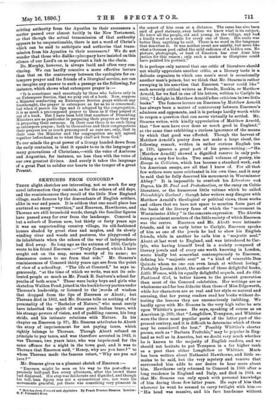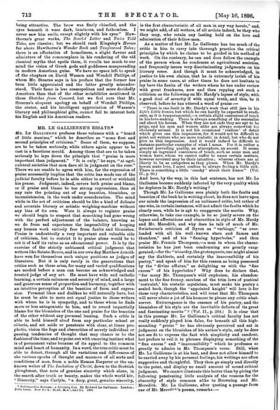SKETCHES FROM CONCORD.*
THESE slight sketches are interesting, not so much for any novel information they contain, as for the echoes of old days,
and the reminiscences they recall of the little New England village, made famous by the descendants of English settlers, alike in war and peace. It is seldom that one small place has nurtured so many "worthies," and Emerson, Hawthorne, and Thoreau are still household words, though the familiar figures have passed away for ever from the landscape. Concord is but a suburb of Boston now, but thirty or forty years ago it was an unpretending country village, its old-fashioned houses shaded by great elms and maples, and its slowly winding river and woods and pastures, the playground of its inhabitants when the echoes of the war of independence had died away. So long ago as the autumn of 1836, Carlyle wrote to his friend Emerson :—" Truly Concord, which I have sought out on the map, seems worthy of its name; no dissonance comes to me from that side." Mr. Stearns's reminiscences of Concord thirty years ago are from the point of view of a schoolboy. "The life at Concord," he says in- genuously, "at the time of which we write, was not its cele-
brated people so much as Mr. Frank B. Sanborn's school for youths of both sexes." Those were lucky boys and girls who skated on Walden Pond, joined in the huckleberry parties under Thoreau's leadership, or listened to the :words of wisdom
that dropped from the lips of Emerson or Alcott; but Thoreau died in 1862, and Mr. Stearns tells us nothing of the personality of the " Bachelor of Nature," who must surely have inherited the spirit of some great Indian brave, with his strange powers of vision, and of paddling canoes, his long stride, and his intimate relations with Nature. In his chapter on Emerson (p. 97), Mr. Stearns attributes to Alcott the story of imprisonment for not paying taxes, which rightly belongs to Thoreau. Though Alcott refused on principle to pay taxes, and was therefore arrested in 1843, it was Thoreau, two years later, who was imprisoned for the same offence for a night in the town gaol, and it was to Thoreau that Emerson said, " Henry, why are you here ?" to whom Thoreau made the famous retort, "Why are you not here ?"
Mr. Stearns gives us a pleasant sketch of Emerson :—
" Emerson might be seen on his way to the post-office at precisely half-past five every afternoon, after the crowd there had dispersed. His step was deliberate and dignified, and though his tall, lean figure was not a symmetrical one, nor were his movements graceful, yet there was something very pleasant in • Sketrher from Crn arra and Appledors By Frank Preston Steam. London t G. P. Putnam's Sons. the aspect of him even at a distance. The same has also been said of good statuary, even before we know what. is its subject. He knew all the people, old and young, in the village, and bad a kindly word or a smile for every one of them. His smile was better than anything he said. There is no word in the language that describes it. It was neither sweet nor saintly, but more like what a German poet called the mild radiance of a hidden sun. No picture, photograph, or bust of Emerson has ever done him justice for this reason ; only such a master as Giorgione could have painted his portrait."
It is perhaps only natural that one critic of literature should not wholly appreciate another critic, as a literary taste is a delicate organism to which one man's meat is occasionally
another man's poison, but we think that Mr. Stearns is rather sweeping in his assertion that Emerson "never could like" such severely critical writers as Fronde, Ruskin, or Matthew Arnold, for we find in one of his letters, written to Carlyle in 1862, " I delight in Matthew Arnold's fine criticism in two little books." The famous lecture on Emerson by Matthew Arnold has always been a matter of controversy between Emerson's admirers and opponents, and it is perhaps hardly worth while to reopen a question that can never virtually be settled. Mr. Stearns writes, with kindly appreciation of Matthew Arnold,. that "few men have ever done so much good in England," at the same time exhibiting a curious ignorance of the means.
by which that good was effected. Though the harvest of Matthew Arnold's poetry does not make a large sheaf, the following remark, written in rather curious English (on p. 119), ignores a great part of his prose-writing:—"He. [Matthew Arnold] showed a dignified reserve in only pub- lishing a very few books. Two small volumes of poetry, his. Essays in Criticism, which has become a standard work, and his American essays, are all that I know of. For all that• few writers were more celebrated in his own time, and it may be said that he fully deserved his monument in Westminster Abbey." It is impossible to overlook his Literature and Dogma, his St. Paul and Protestantism, or the essay on Celtic literature, or the humorous little volume which be called Friendship's Garland ; though later writers may disagree with Matthew Arnold's theological or political views, these works.
and others that we have not space to mention form part of the basis of the literary fame of which the "monument in Westminster Abbey" is the concrete expression. The Alcotte were prominent members of the little society of which Emerson, was the centre. Emerson and Mr. Alcott were intimate- friends, and in an early letter to Carlyle, Emerson speaks. of him as one of the jewels he had to show his English friends, while in another he calls him a "majestic soul."
Alcott at last went to England, and was introduced to Car- lyle, who having himself lived in a society composed of literary jewels and of every one worth knowing in London, wrote kindly but somewhat contemptuously to Emerson, defining his "majestic soul" as "a kind of venerable Don Quixote whom no one can even laugh at without loving.' Probably Louisa Alcott, the author of those delightful books,.
Little Women, with its equally delightful sequels, and An Old- Fashioned Girl, is better known to the present generation than most of the Concord celebrities. Her writings are as. wholesome and far less didactic than those of Miss Edgeworth,
while her characters are so real and her style so natural and amusing, that her young readers read her books without de- tecting the lessons they are unconsciously imbibing. We hardly agree with Mr. Stearns in the very high value he sets upon Whittier's poems. He says, speaking of course as an American (p. 269), that "Longfellow, Tennyson, and Whittier
were the three most popular poets of the latter part of the• present century, and it is difficult to determine which of them may be considered the best." Possibly Whittier's shorter poems, such as " Barbara Freitchie," may be popular in Eng- land as well as in America, but we doubt very much whether he is known to the majority of English readers, and we• should not hesitate to put Tennyson in a far higher rank as a poet than either Longfellow or Whittier. Much has been written about Nathaniel Hawthorne, and little re- mains to be said, but the very mystery and reserve that surrounded him adds to our desire to hear more about him. Hawthorne only returned to Concord in 1860 after a long residence in England and Italy, and died in 1864, so. that Mr. Stearns can only speak with personal knowledge of him during those few latter years. He says of him that. wherever he went he seemed to carry twilight with him :— " His head was massive, and his face handsome without.
being attractive. The brow was finely chiselled, and the eyes beneath it were dark, luminous, and fathomless. I never saw him smile, except slightly with his eyes." Haw- thorne's great works, The Scarlet Letter and Twice Told Tales, are classics ; but we should rank Kingsley's Heroes far above Hawthorne's Wonder Book and Tanglewood Tales ; there is an affectation of homeliness, a slight flavour and admixture of the commonplace in his rendering of the old classical myths that spoils them, it recalls too much to our mind the vision of Greek gods and goddesses masquerading in modern American guise. We have no space left to speak of the chapters on David Wasson and Wendell Phillips, of whom Mr. Stearns says in his preface that the former has been little appreciated and the latter greatly misunder- stood. Their fame is less cosmopolitan and more decidedly American than that of the other notabilities mentioned in these Sketches from Concord, but we feel sure that Mr. Steams's eloquent apology on behalf of Wendell Phillips, the orator, and his intelligent appreciation of Wasson's literary and philosophical gifts, cannot fail to interest both his English and his Amenican readers.







































 Previous page
Previous page